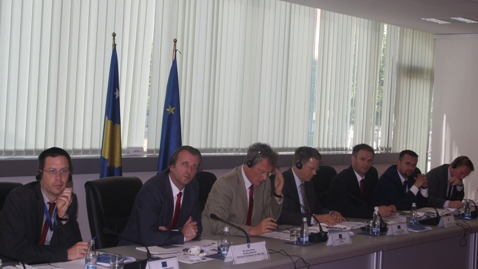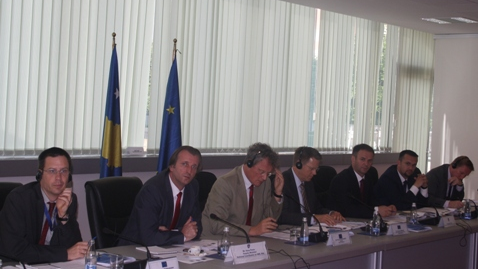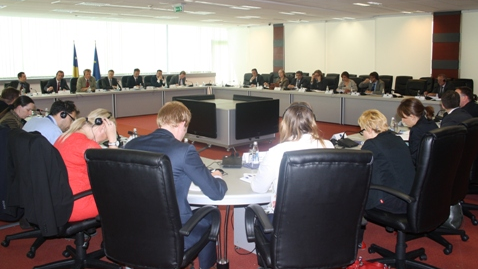

Joint Rule of Law Coordination Board Meeting
The Joint Rule of Law Coordination Board (JRCB) met today at the Main Government Building in Pristina. The meeting was hosted by Samuel Žbogar, EU Special Representative and Head of the European Union Office, and co-chaired by Bernd Borchardt, EULEX Head of Mission, and Hajredin Kuçi, Deputy Prime Minister of Kosovo and Minister of Justice.
The meeting convened to take stock of Kosovo's technical progress in the rule of law area, in particular with respect to fulfilling Roadmaps on War Crimes, Witness Protection, Prisoner Escorts, Forensic Medicine, the KPA Appeals Panel, and the Special Chamber of the Supreme Court. The highlight of the meeting was the announcement that the latest version of the Compact Progress Report will be released on 13 June.
The chair of this meeting, EUSR Samuel Žbogar stated:
"We are facing a period of significant change; institutional changes, changes in the political landscape, and changes in resources. And all this coinciding at a time when there is an accelerating impetus to transition more responsibility to local ownership. The Compact has proven to be a valuable tool for our cooperation, and with a new government just a short time away, we must give thought to how we can evolve our collaboration over the coming months to adapt to the new landscape.
Whilst the existing international presence in Kosovo begins a process of scaling down, the people of Kosovo can rest assured that the European Union remains devoted to fostering Kosovo's future. The difference will be that increasingly, local institutions will be in the driving seat. EU expertise will be less intrusive: Specially targeted IPA projects will continue to support notable gaps in local capacity or expertise until those gaps can be adequately filled by the local institutions themselves. My office will continue to offer guidance on strategic priorities and problem solving. But ultimately, it is in Kosovo's own interest to take control of its own future; to pinpoint needs, to weigh benefits with costs, and to take full responsibility for planning, structuring, budgeting and implementing of its strategies.
Whatever the outcome of the elections may be, the European Union presence in Kosovo will continue to support Kosovo to ensure that its path to Europe remains unerring."
Deputy-Prime Minister and Minister of Justice Hajredin Kuçi reaffirmed Kosovo's support for the Rule of Law and said:
"The contribution of the EU and EULEX in the field of the Rule of Law in Kosovo has had a significant importance in the strengthening of the Rule of Law. The Kosovo Institutions have had a great cooperation with EULEX in all the fields of law which has resulted in strengthening the capacities of the local institutions and the rule of law in general.
The transfer of competencies from EULEX to Kosovo shows that there are increased capacities of the local institutions in fighting crime and the undertaking of such competencies will increase the responsibilities of the local institutions. Today we have discussed regarding many aspects of such process that aims at creating a justice environment that offers equal access to justice to all the citizens of Kosovo.
The Kosovo institutions remain committed to continue the fight against crime in all forms and shapes. Together with the representatives of EU and EULEX we have expressed our commitment to continue enhancing the cooperation with all relevant stakeholders in the general effort to further strengthen the rule of law in Kosovo."
The Head of EULEX, Bernd Borchardt stressed the importance of the Compact, stating:
“This meeting of the Joint Rule of Law Coordination Board provided us with the opportunity to review and discuss progress registered on our common endeavors. The recent agreement to extend our mandate for another two years is a clear position supporting the rule of law in Kosovo and a signal of renewed partnership between Kosovo and EULEX. This is the last meeting before Kosovo elections and the end of EULEX current mandate. We look forward to a new momentum in our cooperation, and ensured today continuity in our partnership. The focus of the next two years will be “more together, for Kosovo.
In this spirit we reviewed our recent commitments and identified areas that still require attention, for example the Roadmaps on War Crimes, the KPA/KPCC, Prisoner Escort for the Mitrovica/Mitrovicë Basic Court, and on Forensic Medicine. While some parts of these agreed Roadmaps have been implemented, we highlighted the work which remains to be done. Likewise, I want to stress the common work on up-dating the anti-corruption matrix which identifies problems to be solved in Kosovo ownership.
We also continued our discussions about Kosovo´s particular challenges with political interference in the rule of law and agreed that a concrete set of measures should be prepared for our next meeting.
Together we took note of the Government of Kosovo’s commitment to work in the coming weeks to overcome the underlying challenges. We stand ready to support Kosovo in its work on these challenges and are confident that, working together, these challenges will be overcome.”

